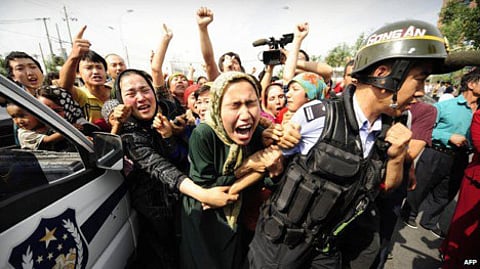Observing Ramadan under harsh conditions
China tightening its grip on the Uighur minority is highly condemnable as they have been subjected to a steady erosion of their right to practise their beliefs

If a minority group of people based on their ethnicity or religious beliefs is pushed hard enough into a corner of helplessness, they will be either forced to fight or flee. If they flee, they solve the problems of the inflictor of the torture. However, if they chose to make a stand and fight back they are immediately branded as militants or terrorists.
Such is the case of the Uighur minority in China. There are an estimated ten million Muslims in a country where Buddhism has the widest influence, with Taoism and Confucianism as the other major religions. Many of us are fortunate to live in countries that allow a degree of religious freedom, one that enables us to practise our faith. The Uighur Muslims, who make up the majority of the native population of the sparsely populated western Xinjiang region of China have been subjected to a steady erosion of their right to practise their beliefs.
This Ramadan, while the rest of the Muslim world fasted in earnest and relatively undisturbed, the Chinese Uighurs have had to contend with additional trials. Chinese officials have officially banned Muslim party members, civil servants, students and teachers from fasting during Ramadan.
Minority leaders have attacked the restrictions on Islamic religious freedom in recent years and have fuelled a rise in militancy against what is often perceived as targeted oppression. Dolkun Isa, the head of World Uighur Congress, recently stated that the Chinese government has jailed more ethnic Uighurs, especially during Ramadan, which started May 16. “They are continuing to put people in those concentration camps while very few people can come out. No one knows under what terms they are detaining people. No one feels safe,” he said.
Sharp resistance
China is increasing its bans and monitoring as Ramadan progresses. “The faith of the Uighurs has been highly politicised, and the increase in controls could cause sharp resistance. This is another attempt by China to control their faith. It can only have dire consequences as such restrictions would force the Uighur people to resist Chinese rule even further.”
Reports suggest that the Chinese government is extracting guarantees from parents, promising that their children won’t fast in Ramadan. China’s goal in prohibiting fasting is to forcibly move Uighurs away from their Muslim culture during Ramadan. Such policies run the risk of invariably leading to instability and conflict.
China’s provincial government has not been discreet about their intentions either. The state media reports that Muslim officials are required ‘to give verbal as well as written assurances guaranteeing they have no faith, will not attend religious activities and will lead the way in not fasting over Ramadan.’ As an added insult, the authorities sponsored several beer drinking festivals in heavily populated Muslims areas during the month.
In the days leading to Ramadan, the city of Tarbaghatay in the northern part Xinjiang ordered schools to communicate to students that ‘during Ramadan, ethnic minority students do not fast, do not enter mosques, and do not attend religious activities’, with threats of strict disciplinary action if such rules were violated.
It doesn’t stop there. Muslim-run shops and restaurants have also been ordered to be open during fasting hours and sell tobacco products and alcohol or risk being shut down. Previously (2014) China had banned the wearing of the Islamic veil in public in the capital city of Urumqi, which lies in the predominantly Muslim region.
Restrictions
The public wearing of veils, beards and T-shirts featuring the Islamic crescent has been banned in many cities across Xinjiang. There have been reports of force-feeding those who insist on fasting. Such restrictions against religious practices is bound to give fuel to the rise in extremism, just the thing the Beijing government should want to avoid. Through extreme measures, they are also hoping that some Uighur may take the bait and leave.
For those who choose to stay and resist, the Chinese want to brand them as dangerous militants. Turdi Ghoja, president of the Washington-based Uighur American Association charges that “China wants to take advantage of the global war on terrorism to legitimise its indulgence in killing, torturing and imprisoning Uighurs.” The concern now is where will such scare tactics and statements eventually lead to?
Today there is a heavy security presence on hand to control this restive province. Let us offer a silent prayer to those brave souls whose faith remains unshaken in the face of such harsh conditions.
Tariq A. Al Maeena is a Saudi socio-political commentator. He lives in Jeddah, Saudi Arabia. Twitter: @talmaeena


